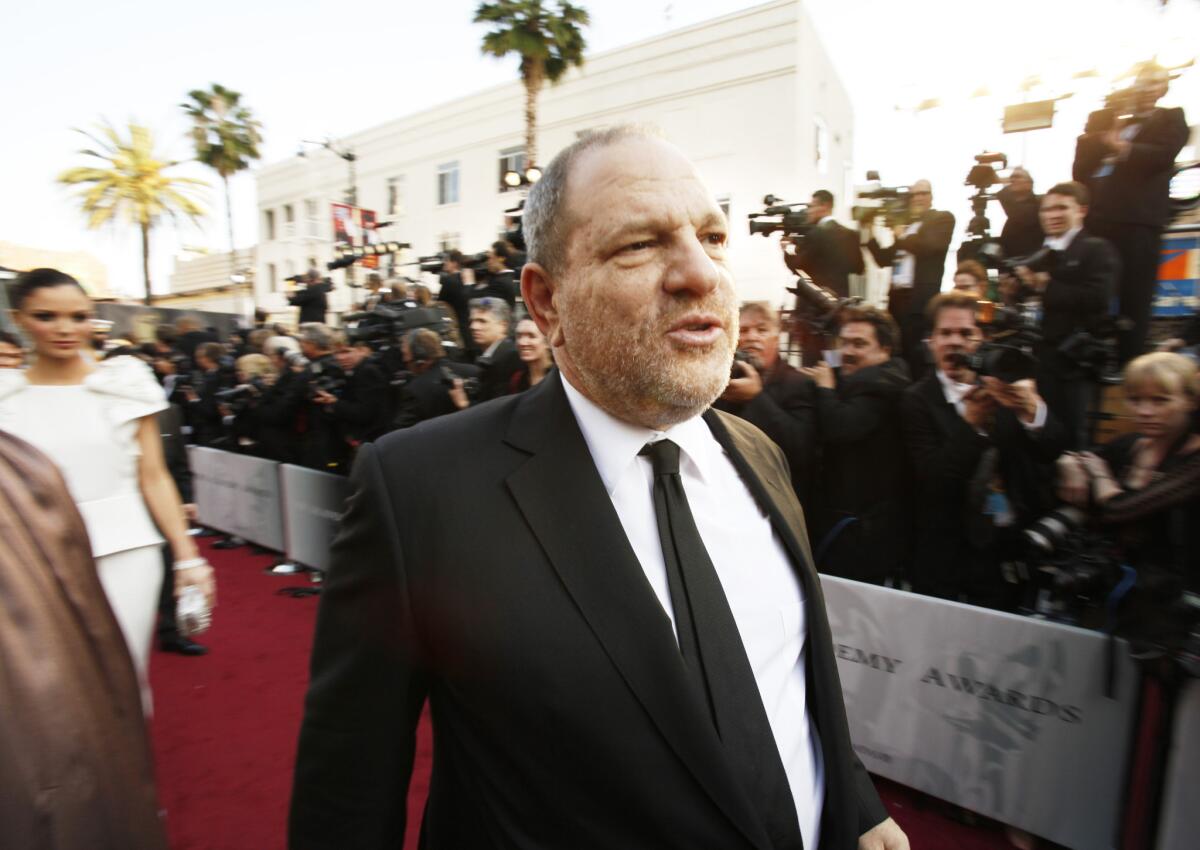Harvey Weinstein’s Hollywood future is in question after sexual harassment allegations

For years, the esteemed Harvey Weinstein pumped out award-winning releases including “Chicago,” “The King’s Speech” and “The Artist.” But lately, the flops have piled up, financing for independent films has shrunk and the producer’s golden touch has lost some of its luster.
Now his Weinstein Co. is facing its biggest crisis yet. On Thursday, Weinstein said he would take a leave of absence after the New York Times published accusations of sexual harassment that stretch across decades. The board is reportedly meeting Friday to discuss his fate.
The allegations cast another shadow over the struggling company and raise questions about Weinstein’s fate — both at the company that bears his name and in Hollywood.
Will A-list actors and directors worried about their public image refuse to work for the company? Will audiences shun future releases? Will business partners give it the cold shoulder?
“The dominos are going to start falling right now,” said Danny Deraney, a Los Angeles-based public relations expert who has worked with entertainment industry clients. “This is not going to be the only thing that comes out. We don’t know the huge severity of everything right now. It could be potentially very damning to everyone involved.”
Weinstein’s future awards prospects could also be damaged because talent may want to avoid Weinstein in the wake of the crisis and Academy voters will be loathe to support films he’s involved with.
“Awards season is where you will probably see the biggest effect, because people won’t want to be associated with an act that would be poison for their careers,” Deraney said.
In the short term, the New York-based Weinstein Co.’s biggest concern probably will be the effect the scandal will have on its sources of capital. The independent studio has relied on financing from banks and other financial organizations to help fund its operations and projects. This includes at least $505 million in financing from a group of institutions led by Union Bank.
“It may make lenders think twice if they feel like their brand may be damaged by being associated with him,” said a former film producer with long experience in the indie world. “That’s where this can hurt them.”
The Weinstein Co. is privately held, with Harvey and his brother, Bob, retaining an estimated 46% interest. Bob Weinstein, who has led a less public existence than his outspoken brother, heads the company’s genre division, Dimension, which releases horror and family friendly movies.
The company’s board of directors is expected to meet by the end of the day Friday to decide Harvey Weinstein’s fate, according to Variety. A spokesperson for the Weinstein Co. didn’t respond to a request for comment about the reported meeting.
If Weinstein is ousted, David Glasser, the company’s president and chief operating officer, could be among the executives who could assume the reins of power.
The company had already been facing some formidable challenges because the market for financing independent films has grown increasingly tough.
When the Weinstein brothers worked under Walt Disney Co. as Miramax, they had access to the entertainment giant’s deep corporate pockets, but they chafed under Disney’s management. Since splitting ways with Disney in 2005, the brothers have had to scrape together financing from sources including Goldman Sachs and other institutions who demanded a return on their investments.
As the box-office hits became fewer in number, Weinstein Co. has sought creative ways to make ends meet. Several years ago, the Weinsteins sold their valuable library of films to a group including Goldman.
In recent months, the company has been exploring a sale of a majority stake in its TV division that would allow the Weinstein brothers to remain involved in the management. A 50% sale would bring in about $300 million, executives said last year.
Weinstein Co. also embarked on a few ill-fated ventures in an attempt to broaden its portfolio, including investments in the Halston fashion brand and Genius Products.
“The minute they thought they were going to create a media empire is when they fell apart,” said a former Miramax executive who worked closely with Harvey Weinstein. Now, “they’re running out of sources of capital and people who want to work with them.”
Recent dead-on-arrival releases include the Alicia Vikander costume drama “Tulip Fever” and the Matthew McConaughey drama “Gold.” The films were panned by critics and drew few people to theaters.
But the company had a modest success earlier this year with “Lion,” the crowd-pleasing tale about an adopted man searching for his birth family that scored several Oscar nominations.
It remains unclear how the scandal will affect Weinstein Co.’s upcoming releases, which include “The Current War,” a historical movie starring Benedict Cumberbatch that received tepid reviews when it premiered at this year’s Toronto Film Festival. The movie is scheduled to have a limited release starting in late November.
More to Read
Inside the business of entertainment
The Wide Shot brings you news, analysis and insights on everything from streaming wars to production — and what it all means for the future.
You may occasionally receive promotional content from the Los Angeles Times.












